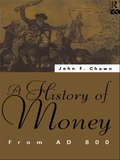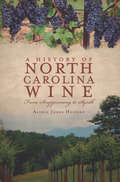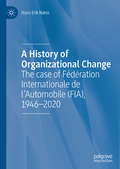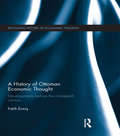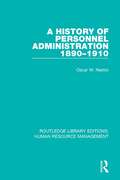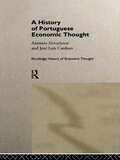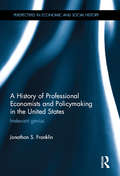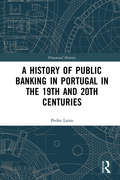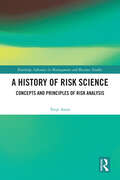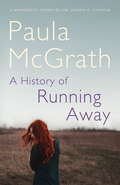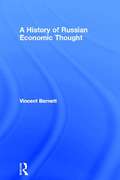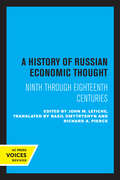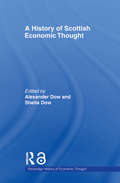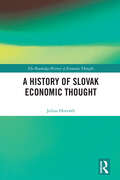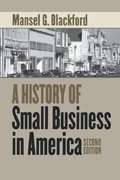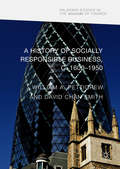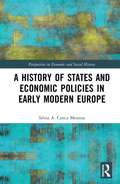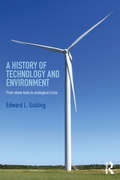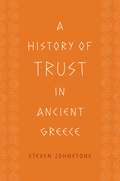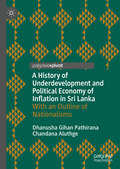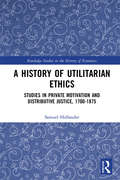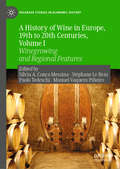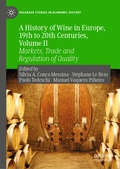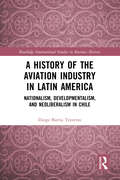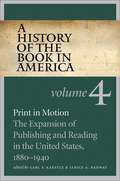- Table View
- List View
A History of Money: From AD 800
by John F ChownThis book presents a detailed and surprising history of money from Charlemagne's reform in approximately AD800 to the end of the Silver Wars in 1896. It also summarizes twentieth century developments and places them in their historical context.
A History of North Carolina Wine: From Scuppernong to Syrah (American Palate)
by Alexia Jones HelsleyTake a journey through the long and exciting history of North Carolina grapes and vines. The state's native grapes grew with a wild abandon that uniformly impressed early explorers. Wine production, however, is another story--one with peaks and valleys and switchbacks. Alexia Jones Helsley recounts a tale of promise that was long unfulfilled, of disappointments and success and of competing visions and grapes. These pages speak to those intrigued by the romance of the native muscadines, appreciative of the complex varieties of North Carolina wine and fascinated by the enduring drama of human beings and their dreams. In the Old North State, the highly acclaimed vineyards of today have deep roots in the state's past.
A History of Organizational Change: The case of Fédération Internationale de l’Automobile (FIA), 1946–2020
by Hans Erik NæssThis book is the first independent exploration of the Fédération Internationale de l’Automobile’s (FIA) institutional history. Virtually unexamined compared with similar institutions like the FIFA and the IOC, the FIA has nevertheless changed from being a small association in 1904 to becoming one of the world’s most influential sport governing bodies. Through chronologically organised chapters, this book explains how the FIA manages to link together motorsport circuses like Formula 1 with the automotive industry and societal issues like road safety and environmental sustainability. In an exciting narrative spanning seven decades, it reviews the FIA’s organisational turning points, governing controversies, political dramas and sporting tragedies. Considering the FIA to be a unique type of hybrid organisation characterised by what the author calls ‘organisational emulsion’, this case study contains theoretical innovations relevant to other studies of sport governing bodies. It makes an empirically grounded contribution to the research fields of institutional logics, historical sociology and sport governance.
A History of Ottoman Economic Thought: Developments Before the Nineteenth Century (The Routledge History of Economic Thought)
by Fatih ErmişThe Ottoman Empire (1299-1923) existed at the crossroads of the East and the West. Neither the history of Western Asia, nor that of Eastern Europe, can be fully understood without knowledge of the history of the Ottoman Empire. The question is often raised of whether or not economic thinking can exist in a non-capitalistic society. In the Ottoman Empire, like in all other pre-capitalistic cultures, the economic sphere was an integral part of social life, and elements of Ottoman economic thought can frequently be found in amongst political, social and religious ideas. Ottoman economic thinking cannot, therefore, be analyzed in isolation; analysis of economic thinking can reveal aspects of the entire world view of the Ottomans. Based on extensive archival work, this landmark volume examines Ottoman economic thinking in the classical period using three concepts: humorism, circle of justice and household economy. Basing the research upon the writings of the Ottoman elite and bureaucrats, this book explores Ottoman economic thinking starting from its own dynamics, avoiding the temptation to seek modern economic theories and approaches in the Ottoman milieu.
A History of Personnel Administration 1890-1910 (Routledge Library Editions: Human Resource Management)
by Oscar W. NestorThis study, first published in 1986, examines and evaluates the personnel techniques and activities that were characteristic of one period in American industrial life. In later years these techniques and activities came to be known as personnel management or personnel administration. By these terms is meant the policies, procedures, and programs that were introduced by companies for the purpose of bringing about constructive and harmonious relationships between management and its own employees. This title will be of interest to students of business studies and human resource management.
A History of Portuguese Economic Thought (The Routledge History of Economic Thought)
by Antonio Almodovar Jose Luis CardosoA History of Portuguese Economic Thought offers the first account in English of the development of economic thought in Portugal. The authors adopt a comparative approach to analyse how economic doctrine, theories and policies have been disseminated and assimilated by Portuguese economists in different periods. They assess the influence on Portuguese economic thought of major economists such as Adam Smith, Keynes and Hayek.
A History of Professional Economists and Policymaking in the United States: Irrelevant genius (Perspectives in Economic and Social History)
by Jonathan S. FranklinOver the course of the twentieth century, professional economists have become a feature in the policymaking process and have slowly changed the way we think about work, governance, and economic justice. However, they have also been a frustrating, paradoxical, and in recent years, controversial fixture in American public life. This book focuses on the emergence and growth of professional economics in the U.S., examining the challenges early professional economists faced, which foreshadowed obstacles throughout the twentieth century. From the founding of the American Economic Association in 1885 to the depths of the Great Depression, this volume illustrates why some of the most optimistic and capable economic minds struggled to help smooth economic transitions and tame market fluctuations. Drawing on archival research and secondary sources, the text explores the emergence of professional economics in the United States and explains how economists came to be ‘irrelevant geniuses’. This book is well suited for those who study and are interested in American history, the history of economic thought and policy history.
A History of Public Banking in Portugal in the 19th and 20th Centuries (Financial History #28)
by Pedro LainsThis book examines the history of what became one of Portugal’s largest banks, the Caixa Geral de Depósitos. The bank was founded in 1876 by the state to run public deposits, and evolved into a savings bank, catering for both public and private deposits. Its history goes beyond the history of banking, as it ties in with the role of the state in the banking sector and financial markets. The book weaves in and out of different political and international contexts, following the many changes of the Portuguese political regime and of its interactions with the national and international economy. The most important lesson from the study is that publicly owned institutions can compete successfully with the private sector when they simultaneously cater for the interests of policy makers as well as those of the public, in this case, the depositors. The history of the Caixa Geral de Depósitos therefore shows how the state of a peripheral economy is capable of successfully managing a large financial institution when the right set of incentives is in place. This work will be a valuable resource for researchers and students of financial and economic history at both the advanced undergraduate and postgraduate levels. It will also provide interesting insights for practitioners in the financial sector.
A History of Risk Science: Concepts and Principles of Risk Analysis (Routledge Advances in Management and Business Studies)
by Terje AvenRisk has been handled as long as there have been humans on Earth. However, the risk field is a young discipline; systematic attempts to access and handle risk – explicitly conceptualizing and expressing risk – in society are a recent endeavour. This book presents a history of risk science and risk analysis highlighting concepts and principles for understanding, assessing, communicating, managing and governing risk.The author presents and discusses key contributions to risk science using a historical lens and from the perspective of a risk scientist. The book strengthens our understanding of what risk science is and how it has evolved by exploring fundamental topics such as risk characterization, risk perception, risk communication, risk handling and decision-making and concludes with reflection on the future of risk science, and in particular what we can learn from its history.A History of Risk Science will be essential reading for risk researchers and graduate students as well as scholars from associated fields applying risk-related analysis to their work.
A History of Running Away
by Paula McGrathBook of the Year in the Irish Times'A wonderful storyteller' Joseph O'ConnorIn 1982 Jasmine wants to box, but in 1980s Ireland boxing is illegal for girls.In 2012 a gynaecologist agonises about a job offer which would mean escape from the increasingly fraught atmosphere of her Dublin hospital. But what about her mother, stuck in a nursing home?And in Maryland Ali, whose mother has recently died, hooks up with a biker gang to escape from grandparents she didn't know she had.Gradually revealing the unexpected connections between the three women, A History of Running Away is a brilliantly written novel about running away, growing up and finding out who you are.
A History of Russian Economic Thought (The Routledge History of Economic Thought)
by Vincent BarnettThe collapse of the Union of Soviet Socialist Republic at the end of the 1980’s was conceived as a victory for capitalist democracy. Here, Vincent Barnett provides the first comprehensive account of the historical development of Russian and Soviet economic thought across the nineteenth and twentieth centuries, and considers its future in the twenty-first century. Utilizing an extensive range of historical sources, Barnett examines the different strands of thought, including classical, neoclassical, historical, socialist, liberal and Marxian schools. He traces their influence, and the impact their ideas had on shaping policies. An excellent addition to the Routledge History of Economic Thought series, this book covers pre-1870, Tsarist economics, the late Tsarist period, the impact of the war, Bolshevik economics, Stalinist economics, Russian economics after 1940. Incorporating a detailed timeline of the most significant Russian economists work and analyzing the effects of historical discontinuities on the institutional structure of Russian economics as a discipline, Barnett delivers an essential text for postgraduates and professionals interested in economic history and the evolution of Russian economic thought.
A History of Russian Economic Thought: Ninth through Eighteenth Centuries
by A. I. PashkovThis title is part of UC Press's Voices Revived program, which commemorates University of California Press’s mission to seek out and cultivate the brightest minds and give them voice, reach, and impact. Drawing on a backlist dating to 1893, Voices Revived makes high-quality, peer-reviewed scholarship accessible once again using print-on-demand technology. This title was originally published in 1964.
A History of Scottish Economic Thought (The Routledge History of Economic Thought)
by Sheila Dow Alexander DowModern economics has, at its foundation, scholarly contributions from many prominent Scottish thinkers. This revealing work examines the roots of this great tradition, places in perspective a selection of authors, and assesses their contribution over three centuries in the light of a distinctive Scottish approach to economics. Scottish Enlightenment is an established area of research interest, and this volume offers new scholarship on key Enlightenment figures whilst placing emphasis on their approach to economic thought. Smith and Hume are key, but other less familiar, yet important authors are also investigated here, including a murderer, a revolutionary, a medical practitioner and a novelist (John Law, Sir James Stuart, John Rae and Shield Nicholson, respectively). The latest in a prestigious series charting national traditions in the history of economic thought, this important book, an essential read for scholars of economic thought, features contributions from such major historians of economic thought as Andrew Skinner and Antoin Murphy.
A History of Slovak Economic Thought (The Routledge History of Economic Thought)
by Julius HorváthSlovakia has a rich and complex history, but until now there has not been a comprehensive analysis of the nation’s economic thought. This volume expertly fills this gap and traces the development of Slovak economic thought from the sixteenth century to the present day. Identifying key themes, moments, and thinkers, the chapters in this work consider the evolution of Slovak economic ideas and explores the nation’s place alongside other schools of thought. Significant coverage is given to the economists Gregorius Berzeviczy and Imrich Karvaš, as well as landmark periods such as the creation of Czechoslovakia, the World Wars, the Socialist regime, and post-Communist Slovakia. This book is of interest to advanced students and researchers of the history of economic thought, economic history, and political economy, as well as those with a specific interest in the history of Slovakia.
A History of Small Business in America
by Mansel G. BlackfordFrom the colonial era to the present day, small businesses have been an integral part of American life. First published in 1991 and now thoroughly revised and updated, A History of Small Business in America explores the central but ever-changing role played by small enterprises in the nation's economic, political, and cultural development.Examining small businesses in manufacturing, sales, services, and farming, Mansel Blackford argues that while small firms have always been important to the nation's development, their significance has varied considerably in different time periods and in different segments of our economy. Throughout, he relates small business development to changes in America's overall business and economic systems and offers comparisons between the growth of small business in the United States to its development in other countries. He places special emphasis on the importance of small business development for women and minorities. Unique in its breadth, this book provides the only comprehensive overview of these significant topics.
A History of Socially Responsible Business, c.1600–1950
by David Chan Smith William A PettigrewThis book examines the changing reciprocal relationships between corporations and their various social obligations over the very long term - from the seventeenth to the twentieth century. Chapters from emerging and established business historians assess the full range of social obligations that corporations held historically. By adopting an innovative methodological approach that is long-term and comparative, this book offers a challenge to the literature on corporate history and will be of interest to researchers and academics in the field of finance and business history.
A History of States and Economic Policies in Early Modern Europe (Perspectives in Economic and Social History)
by Silvia A. Conca MessinaWhy was early modern Europe the starting point of the economic expansion which led to the Industrial Revolution? What was the state’s role in this momentous transformation? A History of States and Economic Policies in Early Modern Europe takes a comparative approach to answer these questions, demonstrating that wars, public finance and state intervention in the economy were the key elements underlying European economic dynamics of the era. Structured in two parts, the book begins by examining the central issues of the state–economy relationship, including military revolution, the fiscal state and public finance, mercantilism, the formation of commercial empires and the economic war between Britain and France in the 1700s. The second part presents a detailed comparison between the different economic policies of the most important European states, looking at their unique demographic, economic, military and institutional contexts. Taken as a whole, this work provides a valuable analysis of early modern economic history and a picture of Europe’s global position on the eve of the Industrial Revolution. This book will be useful to students and researchers of economic history, early modern history and European history.
A History of Technology and Environment: From stone tools to ecological crisis
by Edward L. GoldingThis book provides an accessible overview of the ways that key areas of technology have impacted global ecosystems and natural communities. It offers a new way of thinking about the overall origins of environmental problems. Combining approaches drawn from environmental biology and the history of science and technology, it describes the motivations behind many technical advances and the settings in which they occurred, before tracing their ultimate environmental impacts. Four broad areas of human activity are described: over-harvesting of natural resources using the examples of hunting, fishing and freshwater use; farming, population, land use, and migration; discovery, synthesis and use of manufactured chemicals; and development of sources of artificial energy and the widespread pollution caused by power generation and energy use. These innovations have been driven by various forces, but in most cases new technologies have emerged out of fascinating, psychologically rich, human experiences. This book provides an introduction to these complex developments and will be essential reading for students of science, technology and society, environmental history, and the history of science and technology.
A History of Trust in Ancient Greece
by Steven JohnstoneAn enormous amount of literature exists on Greek law, economics, and political philosophy. Yet no one has written a history of trust, one of the most fundamental aspects of social and economic interaction in the ancient world. In this fresh look at antiquity, Steven Johnstone explores the way democracy and markets flourished in ancient Greece not so much through personal relationships as through trust in abstract systems--including money, standardized measurement, rhetoric, and haggling. Focusing on markets and democratic politics, Johnstone draws on speeches given in Athenian courts, histories of Athenian democracy, comic writings, and laws inscribed on stone to examine how these systems worked. He analyzes their potentials and limitations and how the Greeks understood and critiqued them. In providing the first comprehensive account of these pervasive and crucial systems, A History of Trust in Ancient Greece links Greek political, economic, social, and intellectual history in new ways and challenges contemporary analyses of trust and civil society.
A History of Underdevelopment and Political Economy of Inflation in Sri Lanka: With an Outline of Nationalisms
by Dhanusha Gihan Pathirana Chandana AluthgeThe book provides a new conceptualisation of inflation in underdeveloped economies, through Sri Lanka’s historical experience. It outlines a general theory of nationalisms in their diverse manifestations across the world, within a historical perspective of capitalist development and underdevelopment. The book, therefore, seeks to capture the production mode holistically, within both its infrastructural and superstructural levels probing their interactions. The theoretical structure through which inflation is analysed synthesises the theory of unproductive labour and Marxian theory of prices of production with labour surplus theory of late Dr. S. B. D. De Silva in the context of underdevelopment. In this light, Professor David Laibman’s Allocation Problem is resolved within a Marxist framework to provide an operational significance to the theory and its application. In the same vein the book also provides a new theoretical interpretation of Sri Lanka’s historical development from the British period onwards through application of theories of capitalist development and surplus labour.
A History of Utilitarian Ethics: Studies in Private Motivation and Distributive Justice, 1700-1875 (Routledge Studies in the History of Economics)
by Samuel HollanderIn this landmark volume, Samuel Hollander presents a fresh and compelling history of moral philosophy from Locke to John Stuart Mill, showing that a ‘moral sense’ can actually be considered compatible with utilitarianism. The book also explores the link between utilitarianism and distributive justice. Hollander engages in close textual exegesis of the works relating to individual authors, while never losing sight of the intellectual relationships between them. Tying together the greatest of the British moral philosophers, this volume reveals an unexpected unity of eighteenth and nineteenth century ethical doctrine at both the individual and social level. Essential reading for advanced students and researchers of the history of economic thought, political economy, history of ethics, history of political thought and intellectual history.
A History of Wine in Europe, 19th to 20th Centuries, Volume I: Winegrowing and Regional Features (Palgrave Studies in Economic History)
by Paolo Tedeschi Silvia A. Conca Messina Stéphane Le Bras Manuel Vaquero PiñeiroThis two-volume collection analyses the evolution of wine production in European regions across the nineteenth and twentieth centuries. France and Italy in particular have shaped modern viticulture, by improving oenological methods and knowledge, then disseminating them internationally. This first volume looks closely at the development of winegrowing, with cases ranging from Italian and French regions to smaller producers such as Portugal and Slovenia.
A History of Wine in Europe, 19th to 20th Centuries, Volume II: Markets, Trade and Regulation of Quality (Palgrave Studies in Economic History)
by Paolo Tedeschi Silvia A. Conca Messina Stéphane Le Bras Manuel Vaquero PiñeiroThis two-volume collection analyses the evolution of wine production in European regions across the nineteenth and twentieth centuries. France and Italy in particular have shaped modern viticulture, by improving oenological methods and knowledge, then disseminating them internationally. This second volume looks closely at wine markets and trade, also examining the role of institutions and quality regulation.
A History of the Aviation Industry in Latin America: Nationalism, Developmentalism and Neoliberalism in Chile (Routledge International Studies in Business History)
by Diego Barría TraversoThis book analyzes both the Chilean state policies on commercial aviation and the corporate history of the state-owned airline Línea Aérea Nacional (LAN) between 1929 and 1989. The book covers a transition from the early adoption of policies that were nationalist, from both the national security and economic standpoints, through the complete deregulation of the skies and the sale of the state airline to foreign capital. Both processes were implemented by army officers (Carlos Ibáñez del Campo and Augusto Pinochet, respectively). It shows that LAN’s corporate development was marked by the construction of a national aviation paradigm that, albeit initially characterized by a clear definition of nationalism with the state as preeminent, was far from static over time. As from 1929, the role of the state airline, as both a transport service provider and an instrument of public policy, was subject to review. This was due in part to Chile’s political dynamics in the twentieth century in terms of matters such as the level of consensus/dissent about the development model and the role of the state, SOEs, and the private sector in the economy. It also reflected trends in the commercial airline industry globally, technological advances and, as from the 1970s, pressures to liberalize the sector.
A History of the Book in America
by Janice A. Radway Carl F. KaestleIn a period characterized by expanding markets, national consolidation, and social upheaval, print culture picked up momentum as the nineteenth century turned into the twentieth. Books, magazines, and newspapers were produced more quickly and more cheaply, reaching ever-increasing numbers of readers. Volume 4 of A History of the Book in America traces the complex, even contradictory consequences of these changes in the production, circulation, and use of print. Contributors to this volume explain that although mass production encouraged consolidation and standardization, readers increasingly adapted print to serve their own purposes, allowing for increased diversity in the midst of concentration and integration. Considering the book in larger social and cultural networks, essays address the rise of consumer culture, the extension of literacy and reading through schooling, the expansion of secondary and postsecondary education and the growth of the textbook industry, the growing influence of the professions and their dependence on print culture, and the history of relevant technology. As the essays here attest, the expansion of print culture between 1880 and 1940 enabled it to become part of Americans' everyday business, social, political, and religious lives. Contributors:Megan Benton, Pacific Lutheran UniversityPaul S. Boyer, University of Wisconsin-MadisonUna M. Cadegan, University of DaytonPhyllis Dain, Columbia UniversityJames P. Danky, University of Wisconsin-MadisonEllen Gruber Garvey, New Jersey City UniversityPeter Jaszi, American UniversityCarl F. Kaestle, Brown UniversityNicolas Kanellos, University of HoustonRichard L. Kaplan, ABC-Clio PublishingMarcel Chotkowski LaFollette, Washington, D.C.Elizabeth Long, Rice UniversityElizabeth McHenry, New York UniversitySally M. Miller, University of the PacificRichard Ohmann, Wesleyan UniversityJanice A. Radway, Duke UniversityJoan Shelley Rubin, University of RochesterJonathan D. Sarna, Brandeis UniversityCharles A. Seavey, University of Missouri, ColumbiaMichael Schudson, University of California, San DiegoWilliam Vance Trollinger Jr., University of DaytonRichard L. Venezky (1938-2004)James L. W. West III, Pennsylvania State UniversityWayne A. Wiegand, Florida State UniversityMichael Winship, University of Texas at AustinMartha Woodmansee, Case Western Reserve UniversityThe contributors are Megan Benton, Paul S. Boyer, Una M. Cadegan, Phyllis Dain, James P. Danky, Ellen Gruber Garvey, Peter Jaszi, Carl F. Kaestle, Nicolas Kanellos, Richard L. Kaplan, Marcel Chotkowski LaFollette, Elizabeth Long, Elizabeth McHenry, Sally M. Miller, Richard Ohmann, Janice A. Radway, Joan Shelley Rubin, Jonathan D. Sarna, Charles A. Seavey, Michael Schudson, William Vance Trollinger Jr., Richard L. Venezky, James L. W. West III, Wayne A. Wiegand, Michael Winship, and Martha Woodmansee.-->
